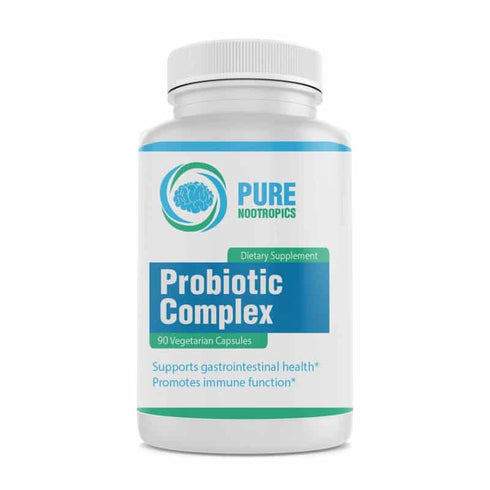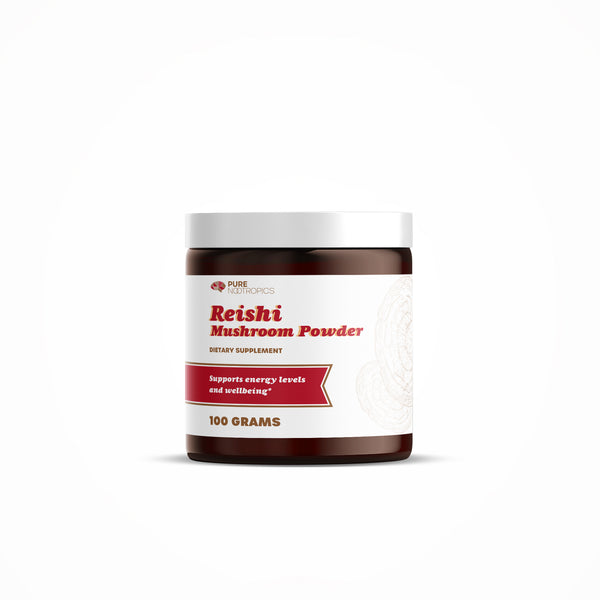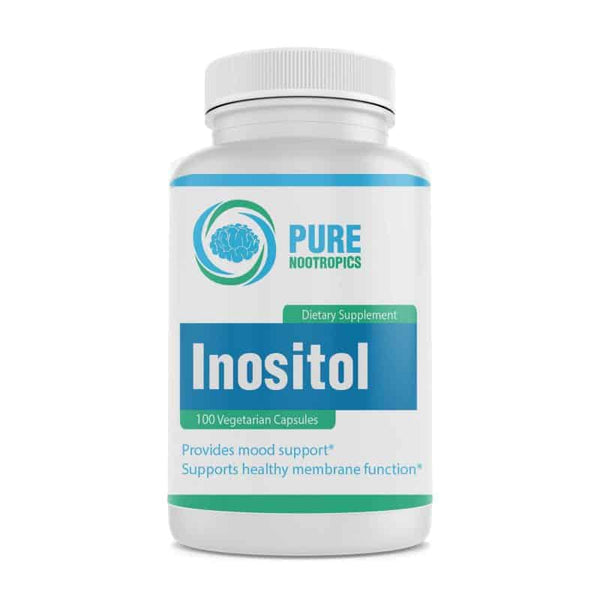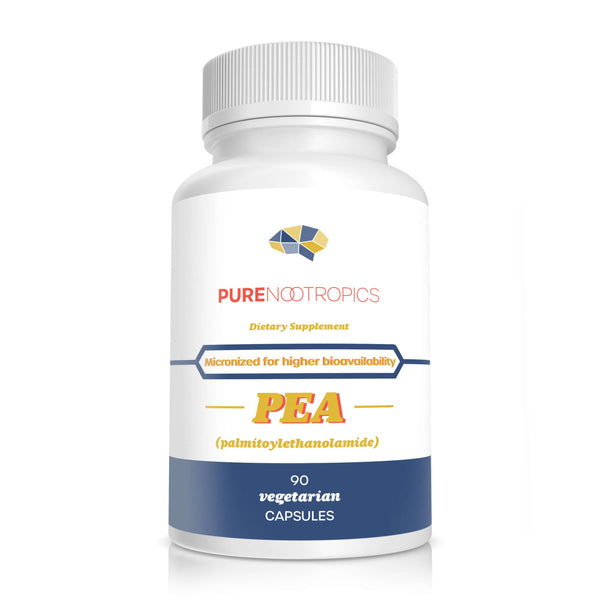Probiotics are live microorganisms which can be supplemented to help maintain intestinal health.
Probiotic Complex Capsules Benefits
Probiotic Complex Capsules Mode of Action
The human gastrointestinal system contains over 500 species of bacteria which help digest, distribute nutrients, and play a large role in the immune system. This system is referred to as a microbiome. The bacteria present in human intestines weight up to 2.2 pounds and there are ten times as many bacterial cells as human cells in the body (1).
The gut microbiome and the central nervous system, enteric nervous system, sympathetic and parasympathetic arms of the autonomic nervous system, neuroimmune, and neuroendocrine systems form what is referred to as the “gut-brain axis”. It is a reflex network for signaling from the gut to the nervous systems and directly to the brain. Brain signals affect sensory, motor, and secretory functions of the gastrointestinal tract, and vice versa. Lactobacillus and Bifidobacterium probiotic formulations may help provide mood support (2).
Imbalances and changes can occur in the microbiome due to dietary habits, medications, and disease processes which can alter the gut microbiome (3).
When probiotics are taken orally, they attach to the mucosa of the intestine and prevent pathogenic, or disease-causing (so-called "bad" gut flora), bacteria from attaching to the epithelial layer of the intestine. Beneficial bacteria, like those found in probiotics, such as Lactobacillus and Bifidobacterium, produce acetic acid, lactic acid, and propionic acid. These acids lower the pH of the intestine and thus prevent the growth of "bad" bacteria (4). Bacterial fermentation occurs at all times, and up to 10% of a human's daily energy needs can be sustained from the byproducts of bacterial fermentation (1).
Probiotics have the ability to produce other inhibitory compounds, such as bacteriocins and short chain fatty acids; producing fatty acids, vitamins, and sugars which promote the growth of beneficial supplemental microbes; and by launching immune system responses against targeted microbes. Probiotics influence which bacteria are abundant by stimulating mucin production, downregulating gut inflammation, and reinforcing barrier effects of the gut—all of which inhibit attachment of the microbes to the intestinal epithelium. Larger numbers of Bifidobacterium and Lactobacillus have been linked to many health benefits (5).
After events which disturb the natural balance, such as toxins or antibiotics, re-establishing healthy numbers of beneficial bacteria will promote a faster recovery to the intestinal microbiome after the disturbance is complete. In order to achieve the best results, probiotics should be consumed after the disturbance as well (5).
The role of the gut microbiome and the immune system is complex. The immunologic barrier creates a stabilization effect in the gut for the intestine through immunoglobulin A (6). Probiotics compete with pathogens to adhere to the intestinal epithelial layer and have demonstrated the ability to support immune system health.
Probiotic Complex Capsules Dosage
Pure Nootropics’ Probiotic Complex Capsules provide 25 Billion CFU per 1 capsule. It is a blend of 10 probiotic strains which include:
- Lactobacillus acidophilus (La-14)
- Bifidobacterium lactis (BI-04)
- Lactobacillus plantarum (Lp-115)
- Lactobacillus casei (Lc-11)
- Lactobacillus rhamnosus (Lr-32)
- Lactobacillus paracasei (Lpc-37)
- Bifidobacterium breve (Bb-03)
- Streptococcus thermophilus (St-21)
- Lactobacillus salivarius (Ls-33)
- Bifidobacterium longum (BI-05)
Suggested use for adults is 1 capsule by mouth daily.
For further information, please see our References Tab above.
The references below are not meant to imply that any of our products treat, cure, or diagnose any disease or human condition. References to clinical studies and pre-clinical studies may use varying dosages and may not represent the dosages or subsequent results of products we sell; however, the references provided are pertinent to the subject supplement itself. References provided are intended for research and informational purposes only and do not represent the entire body of knowledge available on the subject(s) referenced; nor do they represent all possible outcomes associated with the subject(s) referenced including, but not limited to, adverse effects, precautions, or chemical interactions within the human body. The Content provided on this website is not intended to be a replacement for professional medical advice, treatment or diagnosis. Never ignore the advice of a medical professional or delay in attaining professional advice because of information or impressions you gather on this website. Choosing to rely on any information provided by the Content of this website is solely at your own risk. We encourage our audience to do their own research beyond the resources we have provided so your decision is as educated as possible.
• Supports healthy intestinal flora*
Sanders, ME. “Impact of Probiotics on Colonizing Microbiota of the Gut.” J Clin Gastroenterol, 45 Supple: Nov. 2011, pp. S115–9., doi:10.1097/MCG.0b013e318227414a.
• Mood support*
Kane, L, and J Kinzel. “The Effects of Probiotics on Mood and Emotion.” JAAPA, vol. 31, no. 5, May 2018, pp. 1–3., doi:10.1097/01.JAA.0000532122.07789.f0.
• Immune system support*
Erika Isolauri, Yelda Sütas, Pasi Kankaanpää, Heikki Arvilommi, Seppo Salminen, Probiotics: effects on immunity, The American Journal of Clinical Nutrition, Volume 73, Issue 2, February 2001, Pages 444s–450s, https://doi.org/10.1093/ajcn/73.2.444s.
1. Ciorba, Matthew A. “A gastroenterologist’s guide to probiotics.” Clinical gastroenterology and hepatology : the official clinical practice journal of the American Gastroenterological Association vol. 10,9 (2012): 960-8. doi:10.1016/j.cgh.2012.03.024.
2. Kane, L, and J Kinzel. “The Effects of Probiotics on Mood and Emotion.” JAAPA, vol. 31, no. 5, May 2018, pp. 1–3., doi:10.1097/01.JAA.0000532122.07789.f0.
3. Cani PD. Human gut microbiome: hopes, threats and promises Gut 2018;67:1716-1725.
4. Islam, Saif Ul. “Clinical Uses of Probiotics.” Medicine vol. 95,5 (2016): e2658. doi:10.1097/MD.0000000000002658
5. Sanders, ME. “Impact of Probiotics on Colonizing Microbiota of the Gut.” J Clin Gastroenterol, 45 Supple: Nov. 2011, pp. S115–9., doi:10.1097/MCG.0b013e318227414a.
6. Erika Isolauri, Yelda Sütas, Pasi Kankaanpää, Heikki Arvilommi, Seppo Salminen, Probiotics: effects on immunity, The American Journal of Clinical Nutrition, Volume 73, Issue 2, February 2001, Pages 444s–450s, https://doi.org/10.1093/ajcn/73.2.444s
7. Yan, Fang, and D B Polk. “Probiotics and immune health.” Current opinion in gastroenterology vol. 27,6 (2011): 496-501. doi:10.1097/MOG.0b013e32834baa4d
8. “Probiotics: In Depth.” NIH, nccih.nih.gov/health/probiotics/introduction.htm.






